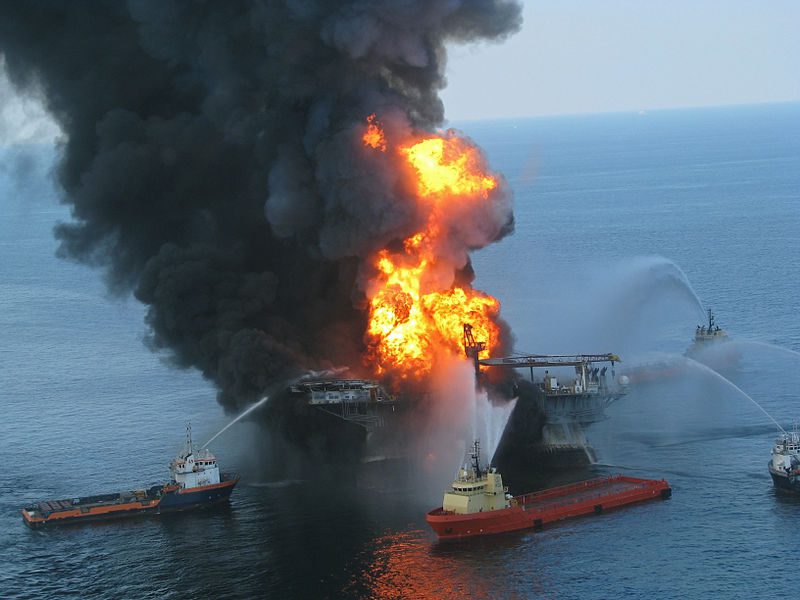US Coast Guard image
By Margaret Cronin Fisk and Daniel Lawton
Dec. 18 (Bloomberg) — A former BP Plc senior engineer was found guilty of destroying evidence sought by the U.S. in a probe of the 2010 Gulf of Mexico well explosion and oil spill.
A federal jury in New Orleans today found the engineer, Kurt Mix, guilty of one of two counts of obstruction of justice. Prosecutors said Mix deleted from his mobile phone text messages and voice mails related to BP’s effort to estimate the size of what turned out to be largest U.S. offshore oil spill.
Mix, who was involved in leading efforts to cap the Macondo well as crude gushed into the gulf, denied intentionally destroying evidence. His lawyer Joan McPhee asked U.S. District Judge Stanwood Duval Jr. to throw out the guilty verdict. Duval deferred ruling on that motion. He released Mix on bond and set sentencing for March 26. Mix faces a maximum of 20 years in prison and a $250,000 fine.
“We remain as convinced as ever of Kurt Mix’s innocence,” McPhee told reporters outside the courtroom after the verdict. “We intend to continue to fight to ensure justice is done.”
The blowout of BP’s Macondo well in deep water off the coast of Louisiana in April 2010 killed 11 people. BP agreed last year to pay $4 billion to resolve the federal criminal probe of its role in the spill.
Company Plea
The London-based company pleaded guilty to 14 criminal counts including 11 for felony manslaughter, one misdemeanor under the Clean Water Act, one misdemeanor under the Migratory Bird Treaty Act and one felony count of obstruction of Congress for misrepresenting the size of the spill.
“Today, a jury in New Orleans found that Kurt Mix purposefully obstructed the efforts of law enforcement during the investigation of the largest environmental disaster in U.S. history,” Mythili Raman, acting assistant U.S. attorney general, said in a statement after the verdict.
Mix, the first defendant in a criminal case over the spill to face a jury, was accused of deleting multiple messages, including one in which he said the spill was bigger than BP said it was. He went on trial on Dec. 2. Jury deliberations began Dec. 16.
He was found guilty of deleting messages in October 2010 involving communications with his supervisor, Jonathan Sprague. He was found not guilty of deleting communications in August 2011 involving exchanges with Sprague and a contractor. Defense lawyers contended there was no evidence that Mix acted with corrupt intent on either occasion.
Jury ‘Compromise’
“It sounds like the jury reached a compromise,” said David Uhlmann, a professor at the University of Michigan Law School in Ann Arbor and former head of the environmental crimes section of the U.S. Justice Department. “There is no excuse for destroying evidence during a criminal investigation but deleting text messages hardly qualifies as the worst misconduct in the gulf oil spill,” Uhlmann said in an e-mail today.
Mix was involved in leading BP’s efforts to cap the well, including a procedure called Top Kill, the U.S. said in court papers. Mix, who had access to internal company data on the amount of oil flowing into the gulf, knew that BP’s internal estimates of the flow rate were “well above” the numbers the company was citing publicly and higher than the maximum 15,000 barrel-a-day limit for Top Kill to succeed, the U.S. said.
Government Meeting
Mix didn’t disclose this at a meeting of government officials and BP engineers in May 2010 and subsequently erased references to it on his iPhone, prosecutors said.
He sent a text message to a supervisor on May 26, 2010, saying that the flow rate was too high for Top Kill to work, Federal Bureau of Investigation Special Agent Barbara O’Donnell said in a sworn statement filed in the case.
“Too much flow rate — over 15,000 and too large an orifice,” Mix said, according to the U.S. He later deleted this text, O’Donnell said. The U.S. was able to recover most of the texts, including this one, using “forensic tools,” she said in an April 2012 filing.
Mix was wrongly cast by the government as a central player in a BP cover-up, McPhee said during the trial.
Mix “repeatedly shared with the government, all through the Macondo response effort, the very same information that these prosecutors claim he was trying to hide,” McPhee told the jury in her opening statement. “He had nothing to hide because he had done nothing wrong.”
‘Corrupt Intent’
“Kurt Mix knew exactly what was on that text message string when he deleted it on Oct. 4 and 5 and intended to obstruct this grand jury investigation,” Leo Tsao, a federal prosecutor, said in closing arguments Dec. 16. “The defendant acted with corrupt intent when he deleted text messages.”
Mix, who was arrested in April 2012, was the first person indicted over the 2010 disaster.
Two BP well-site managers, Robert Kaluza and Donald Vidrine, were charged in November 2012 with involuntary manslaughter for the 11 deaths on the well. David Rainey, the company’s former vice president of exploration for the Gulf of Mexico, was charged that month with providing false statements related to the size of the spill.
All three have pleaded not guilty. Rainey’s trial is scheduled for March. Kaluza and Vidrine face trial in June.
The case is U.S. v. Mix, 12-cr-00171, U.S. District Court, Eastern District of Louisiana (New Orleans).
Copyright 2013 Bloomberg.
Unlock Exclusive Insights Today!
Join the gCaptain Club for curated content, insider opinions, and vibrant community discussions.

 Join The Club
Join The Club










